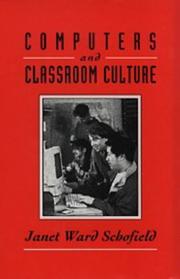| Listing 1 - 3 of 3 |
Sort by
|

ISBN: 0262274914 0585328048 9780585328041 0262082365 9780262082365 9780262274913 Year: 1995 Publisher: Cambridge, Mass. : MIT Press,
Abstract | Keywords | Export | Availability | Bookmark
 Loading...
Loading...Choose an application
- Reference Manager
- EndNote
- RefWorks (Direct export to RefWorks)
Computer-mediated communication (CMC) technologies such as electronic mail, bulletin board services, computer conferencing systems, and the World Wide Web are having a profound effect on education. Learning Networks is a complete guide to the use of these new technologies at the primary, secondary, university, and adult education levels. Drawing on the authors' own considerable experience of teaching and learning online, it describes the learning networks that are available as well as new examples of learning networks that can be created.
Education --- Computer networks. --- Computer networks --- Social Sciences --- Theory & Practice of Education --- Communication systems, Computer --- Computer communication systems --- Data networks, Computer --- ECNs (Electronic communication networks) --- Electronic communication networks --- Networks, Computer --- Teleprocessing networks --- Data transmission systems --- Digital communications --- Electronic systems --- Information networks --- Telecommunication --- Cyberinfrastructure --- Electronic data processing --- Network computers --- Computer uses in education --- Computers in education --- Educational computing --- Microcomputer uses in education --- Microcomputers in education --- Data processing. --- Data processing --- Distributed processing --- Education - Data processing

ISBN: 0262082365 9780262082365 Year: 1995 Publisher: Cambridge London MIT Press
Abstract | Keywords | Export | Availability | Bookmark
 Loading...
Loading...Choose an application
- Reference Manager
- EndNote
- RefWorks (Direct export to RefWorks)
Computer networks --- Computernetwerken --- Computers--Netwerken --- Ordinateurs--Réseaux --- Réseaux d'ordinateurs --- Réseaux informatiques --- Education --- Réseaux d'ordinateurs --- Data processing --- Informatique --- #SBIB:309H501 --- #SBIB:316.334.1O440 --- Computer uses in education --- Computers in education --- Educational computing --- Microcomputer uses in education --- Microcomputers in education --- Communication systems, Computer --- Computer communication systems --- Data networks, Computer --- ECNs (Electronic communication networks) --- Electronic communication networks --- Networks, Computer --- Teleprocessing networks --- Data transmission systems --- Digital communications --- Electronic systems --- Information networks --- Telecommunication --- Cyberinfrastructure --- Electronic data processing --- Network computers --- Mediapedagogiek (incl. mediadidactiek) --- Onderwijsgedrag: algemeen --- Distributed processing --- Education - Data processing

ISBN: 052147924X 0521473683 0511571267 9780521479240 Year: 1995 Publisher: Cambridge : Cambridge University Press,
Abstract | Keywords | Export | Availability | Bookmark
 Loading...
Loading...Choose an application
- Reference Manager
- EndNote
- RefWorks (Direct export to RefWorks)
As important as it is to realize the potential of computer technology to improve education, it is just as important to understand how the social organization of schools and classrooms influences the use of computers, and in turn is effected by that technology in unanticipated ways. In Computers and Classroom Culture, first published in 1996, Janet Schofield observes the fascinating dynamics of the computer-age classroom. Among her many discoveries, Schofield describes how the use of an artificially-intelligent tutor in a geometry class unexpectedly changes aspects like the level of peer competition and the teachers' grading practices. She also discusses why many teachers fail to make significant instructional use of computers and how gender appears to have a crucial impact on students' reactions to computer use. All educators, sociologists, and psychologists concerned with educational computing and the changing shape of the classroom will find themselves compellingly engaged.
Education --- Computer-assisted instruction --- Computer science --- Computers --- Sex role --- Data processing --- Study and teaching --- Social aspects --- Health Sciences --- Psychiatry & Psychology --- Education - Data processing --- Computer science - Study and teaching --- Computers - Social aspects --- Computer-assisted instruction. --- Sex role. --- Data processing. --- Study and teaching. --- Social aspects. --- Gender role --- Gender roles --- Gendered role --- Gendered roles --- Role, Gender --- Role, Gendered --- Role, Sex --- Roles, Gender --- Roles, Gendered --- Roles, Sex --- Sex roles --- Sex (Psychology) --- Sex differences (Psychology) --- Social role --- Gender expression --- Sexism --- Informatics --- Science --- CAI (Computer-assisted instruction) --- Computer-aided instruction --- Computer-assisted learning --- Computer based instruction --- Computer-enhanced learning --- Electronic data processing in programmed instruction --- ILSs (Integrated learning systems) --- Integrated learning systems --- Microcomputer-aided instruction --- Microcomputer-assisted instruction --- Microcomputer-assisted learning --- Microcomputer-based instruction --- Teaching --- Educational technology --- Programmed instruction --- Telematics --- Computer uses in education --- Computers in education --- Educational computing --- Microcomputer uses in education --- Microcomputers in education
| Listing 1 - 3 of 3 |
Sort by
|

 Search
Search Feedback
Feedback About
About Help
Help News
News